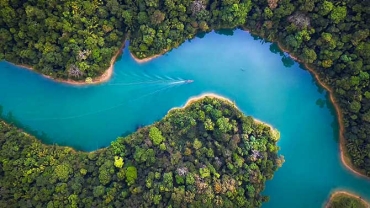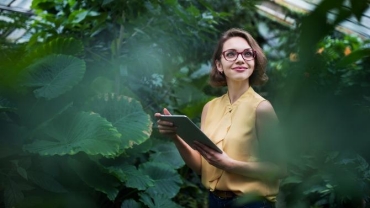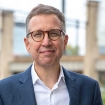
A conversation with professor Louise Vet about biodiversity, risks and new opportunities
Every day we are causing great damage to our natural capital. According to professor of evolutionary ecology Louise Vet and PwC expert and biologist Thijs IJsbrandij, the destruction of our biodiversity is a particularly acute problem. 'We have decimated our natural environment in pursuit of efficiency, intensification and lower costs,' says Vet. 'As the major players continue along the path of a destructive linear economy, I’m convinced that shouting that it’s all going wrong no longer helps. We need to work together with a broad coalition to create new opportunities.'
For Louise Vet – former director of the Netherlands Institute of Ecology, emeritus professor of evolutionary ecology at Wageningen University and advisor to the European Commission in the field of biodiversity – it is absolutely clear: we are hollowing out our planet. 'As humans we have become completely disconnected from nature and nature’s economy, and this realisation is now starting to sink in.'

Destroying the family firm
Vet explains that, as a human race, we have increasingly placed ourselves outside or above nature, even though we are completely dependent on it. 'Nature has been doing ‘research and development’ for billions of years. We have barely arrived and are already destroying the family firm.'
Vet sees it as crucial to ensure that people feel part of nature and therefore cooperate with it. 'Then you can really make a difference.'
'Our lives depend on biodiversity'
This is also the mission of Thijs IJsbrandij, biologist and member of the PwC sustainability team. 'Climate and CO2 emissions receive a great deal of attention, but we should not focus on these issues alone. Biodiversity ensures that the ecosystems on which all life depends, including our own, function properly. We are currently destroying our natural capital. That is the overarching problem and the one we need to address now.'
Doing so is no easy task, however. CO2 is measurable, but there is no such thing as a ‘kilo of biodiversity’. How healthy is nature? Why is diversity important? What impact does restoring the balance have on a small and large scale? What are the risks that stem from disrupting the natural environment, both for society and for businesses? And, above all, what are the opportunities?
Spreading risks, creating opportunities
'Diversity means spreading the risk,' explains Vet. 'There is always a winner when you have a high level of diversity, even when circumstances change. For example, my genetic profile is different from that of my children, which ensures that our whole family is not immediately wiped out if an illness comes along. This point is essential for understanding the importance of biodiversity.' IJsbrandij compares it with an investment portfolio. 'None of our clients put together a financial portfolio consisting of a single asset as the risk would be far too great.'
Contributing to the restoration of biodiversity
IJsbrandij is a member of PwC’s sustainability team and helps companies identify the risks and opportunities involved in contributing to the restoration of biodiversity. 'Every company can investigate the environmental impact of its activities. It is then up to me, and to us as PwC, to have the courage to ask critical questions of our clients and work with them to turn a negative impact into a positive contribution.'
Louise Vet nods in agreement. She firmly believes that change is only possible by working together. In 2018, nature organisations, farmers, scientists, banks and businesses joined forces to work on the Delta Plan for Biodiversity Restoration in a foundation chaired by her. 'We need a complete transition in the area of land use and a new mindset.'
Moving away from growth-focused tunnel vision
Vet points to the role the Netherlands plays in the global food system, with 54 per cent of its total area used as agricultural land. 'The Netherlands has embraced the adage that we have to feed the world and our agriculture has become extremely intensive. For instance, we import a lot of soya to feed our cattle, export the products and then have to deal with the manure ourselves. This really needs to change.'

Further growth cannot always be the answer
As far as IJsbrandij is concerned, the question that needs to be asked is whether a company should always strive to expand its current activities. 'Sometimes growth is important, including from a social perspective, but further growth cannot always be the answer.'
Vet agrees: 'The starting point must be that companies contribute to a nature-inclusive approach to production and this will require a major transformation. We need to move away from the uniformity we see at present in the global economy towards a tailor-made model where companies are far more attuned to the needs of the area in which they operate.'
If it were up to her as a biodiversity champion, the Netherlands would specialise in sustainable food production and regenerative agriculture. 'This country knows a lot about water, but we don’t export dykes. We export knowledge. We can also do the same in the field of sustainable food production.'
Opportunities create new winners
According to IJsbrandij, the issue of sustainability should form part of every client conversation. 'At the moment we are still too often taking a compartmentalised approach. Project X is a sustainability project, project Y an IT project, project Z an annual audit, and so on. I want to make sure we address sustainability within every project and identify the opportunities that will stem from working with nature instead of against it.'
Opportunities – that is the key word for ecology expert Louise Vet. 'You need to discuss the three pillars of sustainability with every client,' she says referring to the energy transition, circular economy cycle and restoration of biodiversity. 'Nobody likes doom and gloom so focus on the opportunities.'
Creating successful new business models
While being the first to admit that there are risks, Vet recommends always emphasising nature’s enormous resilience and pointing out the potential for creating successful new business models that can really help society move forward. 'Everyone wants to be a winner and be amongst the winners,' she concludes. 'As PwC, you can tell that story. I am counting on you.'



















